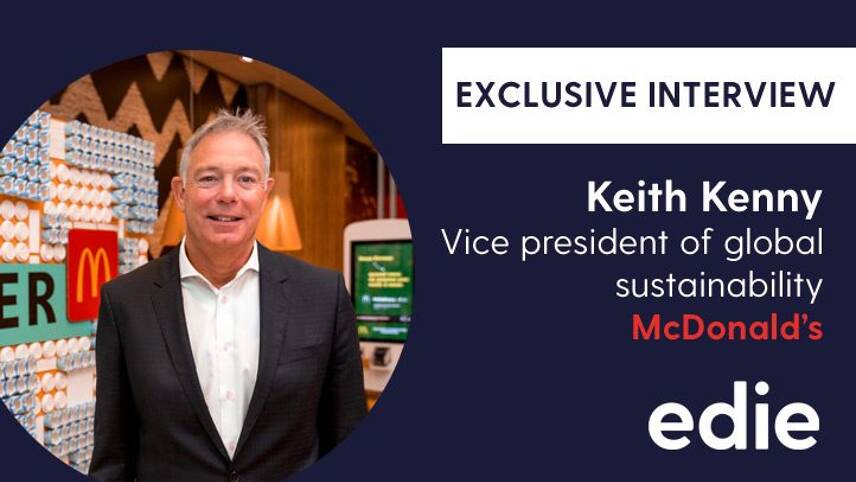Register for free and continue reading
Join our growing army of changemakers and get unlimited access to our premium content

Kenny spoke on the need to balance consumer demands with scientific environmental considerations
In 2018, McDonald’s announced that by 2025, 100% of its guest packaging will come from recycled, renewable or certified sources – the preference being Forest Stewardship Council (FSC) certified – while also aiming to recycle 100% of restaurant packaging.
At the time, 50% of McDonald’s customer packaging came from the preferred sources, and 64% of fibre-based packing came from certified or recycled sources. While plastics account for just 12% of its packaging in Europe, McDonald’s is one of the hundreds of consumer-facing brands that have heard and responded to calls to cut back on single-use plastics to help alleviate the worrying trend that the material is choking the oceans and natural environment.
McDonald’s vice president of global sustainability Keith Kenny claimed that replacing single-use plastics with other items can lead to “trade-offs” both in terms of environmental footprints and customer preferences. However, he told edie that businesses must respond to consumer demands.
“One of the mantras that we use is ‘progress over perfection’ and we have to do internal tests before we put packaging on the market to make sure it is safe for food and customers,” Kenny told edie. “But our stance is that it is better to trial these ideas and get feedback from customers. It helps us move forward and deliver new solutions that work for the customer and help improve our environmental footprint.”
More than half of UK consumers have reportedly changed their food purchasing habits based on the ongoing debate around plastics packaging created by shows like Blue Planet II. This has created an imperative for consumer-facing businesses to act on packaging in recent years.
However, the main issue with plastics isn’t that they aren’t recyclable, but rather they don’t get collected for recycling in the first place. Nevertheless, businesses like McDonald’s have moved to phase-out plastics in order to appease consumer demands.
Today (14 November), McDonald’s announced a range of new trials and pilots across Europe to remove single-use plastics and improve recyclability. It focuses on redesigning McFlurrys to avoid the need for plastic lids; additionally, around 1,200 tonnes of plastic will be saved annually by introducing a renewable fibre lid for cold drinks in France, made from 100% certified sustainable sources and recyclable materials.
Kenny claimed that the lids set to be rolled out in France aren’t “perfect” but that it does allow McDonald’s to gain insight on how customers interact with a view to creating a final product that meets both environmental and customer needs.
“We know that [the lids] are perhaps not the perfect solution,” Kenny said. “But the lid works, it functions and there are options there to improve based on feedback.
“Option 2.0 is in the works, but we felt it was important to get it out there and connect with our customers to show them that we are acting on plastics.”
Lifecycle approach
McDonald’s utilises lifecycle analysis to generate detailed information on the environmental impacts of its packaging from the supply chain to the end of life. This type of analysis is growing in popularity, especially in packaging where potential plastics alternatives like bio-based, biodegradable and oxy-degradable can all lead to trade-offs and unintended consequences.
One of the areas where McDonald’s has acted on that has, in fact, led to an unintended consequence that picked up negative media reaction is the phase-out of plastic straws.
McDonald’s started phasing out plastic straws from UK locations in May 2018. However, following feedback that the paper replacements also couldn’t be recycled, the company has issued a new variant of paper straw that is stronger while still consisting of fully recyclable materials.
The restaurant chain uses 1.8 million straws a day in the UK and ensuring the recyclability of the items is key to McDonald’s overall goal to source all packaging from renewable or recycled sources by 2025.
Kenny argued that if McDonald’s didn’t move to paper straws the same conversations would still occur but focused on plastics. The decision, he said, had actually helped pushed the infrastructure and recycling firms to start handling the material.
“The paper straw is totally recyclable, but the challenge is getting it to the recycling facilities and then those facilities handling it,” Kenny added. “The dilemma is a bit of a ‘chicken and egg’ scenario; you either wait for the facilities to be in place or you move how your customers want you to and then try and use the additional volume in the market to drive the industry towards better recycling solutions.
“We didn’t have enough paper straw production globally to just provide for just the UK market, and our decision has actually helped increase the production volume in the UK by creating a critical volume of demand and investment and we can now persuade facilities to start recycling them.”
McDonald’s is already more than 60% of the way to its 2025 targets and the company is aiming to have all of its restaurants globally provided recycling for consumer packaging. In the UK, this currently stands at 90%, with Germany close behind at 89% of restaurants. The company believes this will help limit how much of its packaging ends up as litter.
“There’s always trade-offs and challenges in sustainability,” Kenny added, but he reaffirmed that the company would take a consumer-led approach to solve its environmental issues unless obvious lifecycle issues emerged.
Matt Mace


Please login or Register to leave a comment.